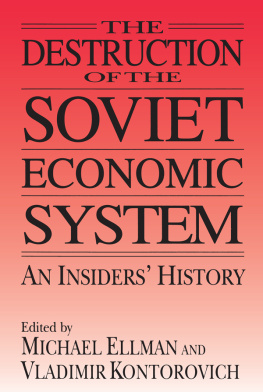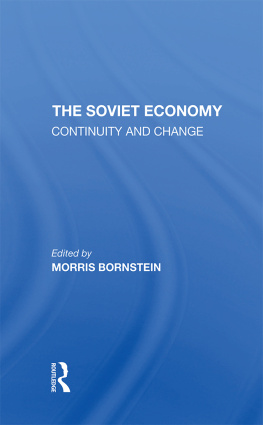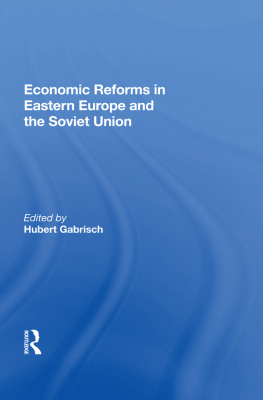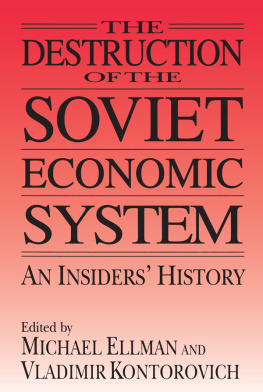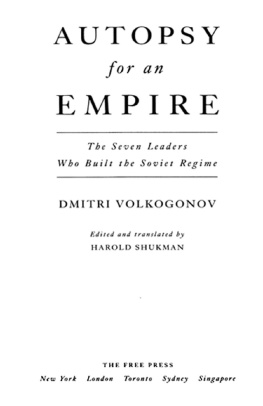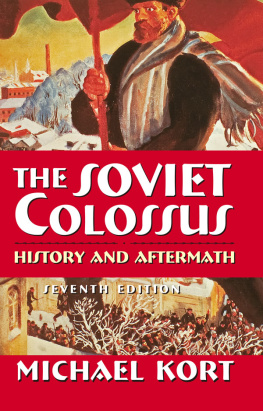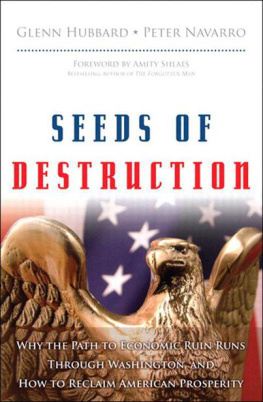The Destruction
of the
Soviet Economic
System
Of Related Interest
__________
Cold War Capitalism
The View from Moscow, 19451975
Richard B. Day
The Great Market Debate in Soviet Economics
An Anthology
Edited by Anthony Jones and William Moskoff
Controversies in Soviet Social Thought
Democratization, Social Justice, and the Erosion of Official Ideology
Murray Yanowitch
Hard Times: Impoverishment and Protest in the Perestroika Years
The Soviet Union 19851991
William Moskoff
Property to the People
The Struggle for Radical Economic Reform in Russia
Lynn D. Nelson and Irina Y. Kuzes
Radical Reform in Yeltsins Russia
Political, Economic, and Social Dimensions
Lynn D. Nelson and Irina Y. Kuzes
New Rich, New Poor, New Russia
Winners and Losers on the Russian Road to Capitalism
Bertram Silverman and Murray Yanowitch
THE
DESTRUCTION
OF THE
SOVIET
ECONOMIC
SYSTEM
AN INSIDERS HISTORY
EDITED BY
MICHAEL ELLMAN AND
VLADIMIR KONTOROVICH

First published 1998 by M.E. Sharpe
Published 2015 by Routledge
2 Park Square, Milton Park, Abingdon, Oxon OX14 4RN
711 Third Avenue, New York, NY 10017, USA.
Routledge is an imprint of the Taylor & Francis Group, an informa business
Copyright 1998 Taylor & Francis. All rights reserved.
No part of this book may be reprinted or reproduced or utilised in any form or by any electronic, mechanical, or other means, now known or hereafter invented, including photocopying and recording, or in any information storage or retrieval system, without permission in writing from the publishers.
Notices
No responsibility is assumed by the publisher for any injury and/or damage to persons or property as a matter of products liability, negligence or otherwise, or from any use of operation of any methods, products, instructions or ideas contained in the material herein.
Practitioners and researchers must always rely on their own experience and knowledge in evaluating and using any information, methods, compounds, or experiments described herein. In using such information or methods they should be mindful of their own safety and the safety of others, including parties for whom they have a professional responsibility.
Product or corporate names may be trademarks or registered trademarks, and are used only for identification and explanation without intent to infringe.
Library of Congress Cataloging-in-Publication Data
The destruction of the Soviet economic system : an insiders history /
edited by Michael Ellman and Vladimir Kontorovich.
p. cm.
Includes bibliographical references and index.
ISBN 0-7656-0263-6 (cloth : alk. paper)
ISBN 0-7656-0264-4 (pbk : alk. paper)
1. Soviet UnionEconomic policy19861991. 2. Perestroka.
I. Ellman, Michael. II. Kontorovich, Vladimir.
HC336.26.D48 1998
338.947009048 dc21
9752682
CIP
ISBN 13: 9780765602640 (pbk)
ISBN 13: 9780765602633 (hbk)
Contents
Michael Ellman and Vladimir Kontorovich
Michael Ellman and Vladimir Kontorovich
Vladimir Shlapentokh
Sergei Belanovsky
Moisei Eydelman
Gregory Khanin
Gennadii Zoteev
Vadim Medvedev
Igor Prostiakov
Igor Prostiakov
OlegYun
Igor Prostiakov
Vadim Kirichenko
Vladimir Mozhin
Vadim Medvedev
Vadim Medvedev
Yurii Belik
Vladimir Mozhin
Vadim Kirichenko
Vadim Medvedev
Vladimir Mozhin
Yurii Belik
Oleg Yun
Gennadii Zoteev
Yevgenii Yasin
Vladimir Mozhin
Vadim Medvedev
Oleg Yun
Yevgenii Yasin
Vadim Medvedev
Oleg Yun
Yurii Belik
Vadim Medvedev
Vladimir Mozhin
Yurii Belik
Yevgenii Yasin
Alexander Tsipko
Lev Freinkman
Yurii Kuznetsov
Lev Freinkman
Vladimir Mozhin
Yevgenii Yasin
Yurii Belik
Philip Hanson
Sergei Belanovsky
Nikolai Nesterovich
Rozalina Ryvkina
Viktor Kurierov
Boris Ladygin
Yevgenii Yasin
Viktor Kurierov
Yurii Belik
Lev Freinkman
Sergei Belanovsky
For most of the twentieth century, there existed two rival ways of organizing modern society and economy: Western capitalism and Soviet socialism. The sudden disappearance of the latter transformed the world as much as the Bolshevik Revolution did earlier in the century. This book is concerned with the economic history of the collapse of the Soviet civilization, with its centrally planned economy, one-party government, and official ideology, that occurred between 1985 and 1991. (The collapse of income and product following the breakup of the system is not addressed here.) Other aspects of that immense eventideology, political changes, international affairs, public beliefs and attitudesare addressed only to the extent that they interacted with the economy. This does not mean that we consider the economy the main cause of collapse. Indeed the opposite is the case. It merely reflects our interests and professional baggage.
The end of the Soviet system is described here by eyewitnesses who were then directly involved in running its key institutions. Their unique testimony constitutes the bulk of this book. The motivation for such an approach and the description of the methods used for collecting the evidence are discussed in presents our account of the collapse based on our reading of the evidence in this book.
Haverford College and the University of Amsterdam provided financial support for this work. Vladimir Drebentsov and Lev Freinkman gave generously of their time and effort. This book would have never appeared but for their dedication. Igor Prostiakov, Vitaly Rasnitsyn, Yelena Starostenkova, and Aleksei Melentiev helped in locating the contributors. The editors are grateful to Philip Hanson, Holland Hunter, Frederick Pryor, and Vladimir Shlapentokh for their helpful suggestions on the AAASS (the American Association for the Advancement of Slavic Studies) convention in Washington, DC. Alexander Katsenelinboigen translated most of the Russian texts. Catharine Cooke, Maxim and Nadezhda Dolgikh, Victor Frank, Sara Kirschhoff, E.V. Kontorovich, and Leonid Kontorovich translated the rest. Patricia Ellman helped with the editing.
.
| AN | Akademiia nauk, Academy of Sciences of the USSR |
| AUCCTU | All-Union Central Council of Trade Unions |
| CC | Central Committee of the CPSU |
| CM | Council of Ministers of the USSR |
| CMEA | Council for Mutual Economic Assistance (often referred to in the West as Comecon) |
| collegium | Governing body of a ministry or a commission/committee, composed of the top boss, his deputies, and the heads of main structural divisions |
| CPSU | Communist Party of the Soviet Union |
Next page
